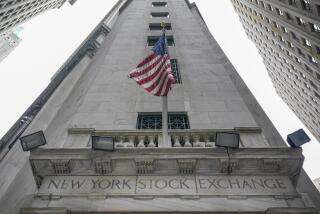DERIVATIVES STRIKE AGAIN : Barings Crisis Could Ripple Across Borders : Securities: Should the rest of the world worry about fallout from the British bank’s collapse? Maybe.
- Share via
NEW YORK — To the average American, the shenanigans of a rogue trader for an illustrious British bank may seem as remote as the Singapore market, where he moved hundreds of millions of dollars on computerized trading screens. But in an increasingly integrated global economy, the consequences of Barings’ collapse could have subtle influences over interest rates, U.S. financial markets and the way money moves across international borders.
Questions and answers on what the collapse means:
*
Q: Need I worry about the failure of a bank based across the Atlantic Ocean?
*
A: Maybe. Bad news swiftly transcends foreign borders in today’s electronic financial world, and the Barings calamity was no exception. Asian foreign markets tumbled Monday amid word of the astonishing size of the bank’s loss.
Behind the reaction were fears of further ripples. Like other global investment banks, Barings traded and invested in a range of foreign stocks, bonds and other securities, some riskier than others. These included a variety known as stock index futures, which allowed a single trader in Barings’ Singapore office to make a huge bet on the direction of Japanese stocks.
Barings sought the British equivalent of bankruptcy protection over the weekend; the dust will be settling for weeks and months to come.
But in the near term, economists and market experts say, the bank’s collapse could temporarily slow the flow of investment money across international borders, give a lift to the U.S. stock and bond markets and help keep a lid on interest rate increases.
*
Q: Let’s take it one at a time. Why should I care about the flow of money across international borders?
*
A: Foreign securities are an important investment for Americans. Many mutual funds are heavily invested in foreign stocks and bonds. The Barings crisis could make U.S. portfolio managers skittish about risking mutual fund money in foreign markets that are reacting nervously to the Barings crisis. Already, Mexico’s financial turmoil has led to a downturn in some emerging markets around the world and weakened the performance of mutual funds that invest in them.
“I think this temporarily tends to slow down the flow of funds internationally, but only temporarily,” said Henry Kaufman, who owns an international money management and economic consulting firm based in New York.
“In the Mexican situation, it probably has encouraged some U.S. dollar investments to stay in the United States and probably contributed somewhat to the strength of U.S. money and bond markets.”
*
Q: So that’s why it could help U.S. financial markets. But why the potential for steadier interest rates?
*
A: The United States and many foreign governments, including major European nations, have been steadily increasing interest rates this past year. The higher rates aim to restrain economic growth before it leads to increased inflation. The Barings crisis throws a cloud over those policies, said John Lonski, a senior economist at Moody’s Investors Service, a major Wall Street credit rating firm. An increased hesitancy among investors to buy foreign stocks and bonds could boost the need for other sources of financing, notably bank loans, and thus pressure central banks to keep a lid on rates, he said.
*
Q: What assurances do we have that a Barings crisis won’t strike a U.S. investment bank?
*
A: Not much. Many financial experts say the bank’s failure points up the need for a concerted international effort for tighter regulations, particularly over derivatives, the catch-all term for complex securities that derive their value from an underlying market in stocks, bonds, currencies or commodities. U.S. investment houses are expected to closely re-examine their own trading systems and employees in the aftermath of the Barings collapse.
“For any of the big banks who are trading in derivatives, it’s a wake-up call,” said Steven Kaplan, a finance professor at the University of Chicago Graduate School of Business.
*
Q: Could the Barings problem have an impact on U.S. banks that may have provided loans or services to Barings?
*
A: That’s not yet clear. But Citicorp, the nation’s largest bank and a major provider of custodial services for Barings’ trading activities, said it is evaluating its own exposure, a possible warning sign that the British bank’s collapse could have widening ripples.
More to Read
Inside the business of entertainment
The Wide Shot brings you news, analysis and insights on everything from streaming wars to production — and what it all means for the future.
You may occasionally receive promotional content from the Los Angeles Times.








